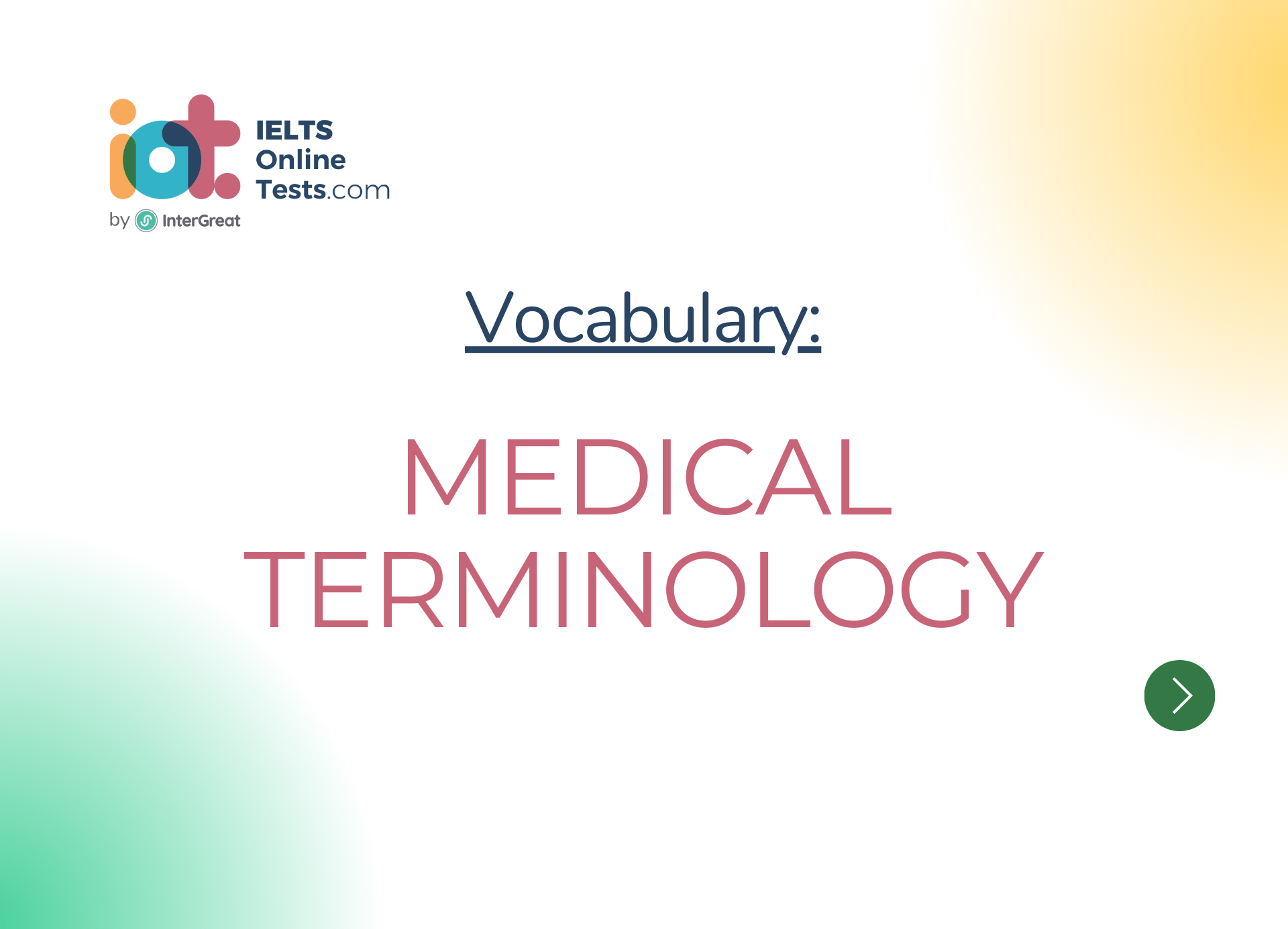
Medical terminology
Below is a detailed list of medical terminology and vocabulary that can help you discuss various medical concepts and practices in English, suitable for the IELTS band score range of 6.5-8.0:
Diagnosis:
Definition: The identification of a disease or condition based on symptoms, patient history, and medical tests.
Example: The doctor made an accurate diagnosis of the patient's illness.
Symptom:
Definition: Any subjective evidence of a disease or abnormality experienced by the patient.
Example: Fever is a common symptom of many infections.
Treatment:
Definition: Medical care given to improve or cure a disease or condition.
Example: The doctor prescribed antibiotics as part of the treatment for the bacterial infection.
Medication:
Definition: Drugs or pharmaceutical substances used to treat diseases or symptoms.
Example: The patient is taking medication to manage his high blood pressure.
Prognosis:
Definition: The likely course and outcome of a disease or condition.
Example: With proper treatment, the prognosis for recovery is good.
Surgery:
Definition: Medical procedures that involve cutting into the body to treat a disease or injury.
Example: The patient underwent surgery to remove the tumor.
Anesthesia:
Definition: The use of drugs to prevent pain during surgery or medical procedures.
Example: The anesthesiologist administered anesthesia before the surgery.
Infection:
Definition: The invasion and multiplication of harmful microorganisms in the body.
Example: The wound became infected, causing redness and swelling.
Vaccination:
Definition: The administration of a vaccine to stimulate the body's immune system and prevent diseases.
Example: Children should receive regular vaccinations to protect against preventable diseases.
Immune System:
Definition: The body's defense system against infections and diseases.
Example: The immune system produces antibodies to fight off viruses.
Chronic:
Definition: Persisting over a long period of time or characterized by slow progression.
Example: Diabetes is a chronic condition that requires lifelong management.
Acute:
Definition: Severe and sudden onset of symptoms, often short-lived.
Example: The patient was admitted to the hospital for treatment of acute chest pain.
Rehabilitation:
Definition: The process of restoring physical or mental abilities after an injury or illness.
Example: The athlete underwent rigorous rehabilitation to recover from the sports injury.
Diabetes:
Definition: A chronic metabolic disorder characterized by high blood sugar levels.
Example: Type 2 diabetes can be managed through diet and medication.
Hypertension:
Definition: High blood pressure, a risk factor for heart disease and stroke.
Example: Regular exercise and a balanced diet can help manage hypertension.
Cardiovascular:
Definition: Relating to the heart and blood vessels.
Example: Cardiovascular diseases are a leading cause of mortality worldwide.
Respiratory:
Definition: Relating to the organs and structures involved in breathing.
Example: Smoking can lead to respiratory problems such as chronic bronchitis.
Neurological:
Definition: Relating to the nervous system and the brain.
Example: The patient underwent a neurological examination to assess cognitive function.
Gastrointestinal:
Definition: Relating to the digestive system.
Example: Gastrointestinal disorders can cause symptoms like abdominal pain and bloating.
Radiology:
Definition: The branch of medicine that uses medical imaging techniques, such as X-rays, to diagnose and treat diseases.
Example: The radiologist reviewed the X-ray to look for any abnormalities.
Pathology:
Definition: The study of diseases and their causes, processes, and effects.
Example: The pathologist examined tissue samples to determine the nature of the tumor.
Emergency:
Definition: A sudden and severe medical condition requiring immediate attention.
Example: The patient was rushed to the emergency room after a car accident.
Cholesterol:
Definition: A fatty substance present in the blood, high levels of which can contribute to heart disease.
Example: The doctor advised the patient to lower their cholesterol through diet and exercise.
Allergy:
Definition: A hypersensitivity reaction of the immune system to a substance, often resulting in symptoms like sneezing and itching.
Example: The patient experienced an allergic reaction after eating peanuts.
Genetics:
Definition: The study of heredity and the variation of inherited characteristics.
Example: Genetic testing can identify the presence of certain inherited diseases.
By familiarizing yourself with these medical terms, you can communicate more effectively about health-related topics, contributing to a higher band score in the IELTS exam. Good luck with your studies!




